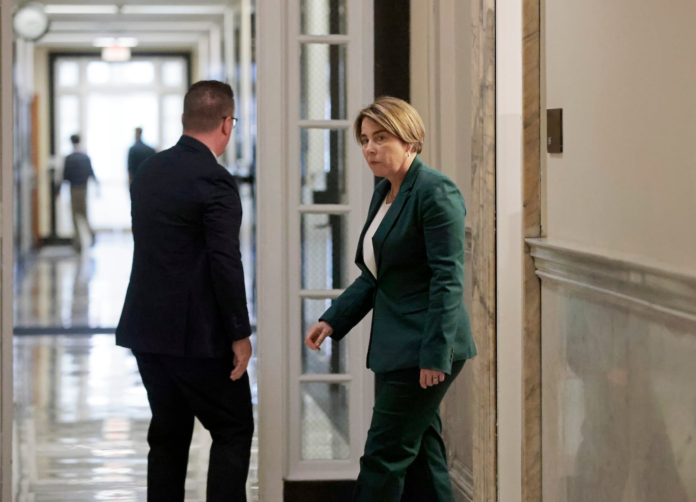No budget is going to please everyone, but Healey’s proposal represents a good starting point for discussions in the Legislature, which will analyze, fine-tune, and revise the plan in the coming months.
The $62 billion fiscal 2026 budget proposal Governor Maura Healey filed Wednesday, which calls for spending growth of 3 percent over this year, would make important investments in those areas, from child care to the MBTA.
The surtax on income over $1 million, which was approved by voters in 2022, is doing what it was intended to: pave the way for major investments in transportation and education.
The budget also reflects the challenges the state is facing — a soaring need for housing services and rising costs in areas from health care to long-term pension obligations. Healey seeks to meet those needs with several new and one-time revenue sources, including imposing the sales tax on candy and imposing a penalty for excessive drug pricing. She is also seeking savings from closing hospitals and laying off mental health workers, proposals lawmakers must carefully scrutinize to determine impacts on patient care.
Some of the biggest investments are in education and housing. Education spending includes $7.3 billion — a $420 million increase over this year — in Chapter 70 payments to school districts to reflect the fifth of six years of implementing the state’s revised school funding formula. It would continue funding universal school meals and add new programs focused on improving early literacy instruction and instituting high-dosage tutoring to compensate for pandemic-era learning loss. There’s money to halve the 20,000-person waiting list for adult English classes.
Advertisement
Importantly, the budget continues investing in early childhood education, with $475 million for the C3, or Commonwealth Cares for Children, grant program, which gives money based on a formula to all of the state’s child-care providers, along with increased rates for child-care providers and an expansion of subsidized pre-kindergarten in Gateway Cities.
Healey would continue prior year investments in financial aid for public college students while proposing a new bond bill to vastly expand the money available for public college building projects.
On transportation, Healey would put a big chunk of the “millionaire’s tax” proceeds into the MBTA, which faces a large operating deficit due to lower ridership after the pandemic combined with higher costs. All told, the T would get about $1.3 billion more from the state than it currently collects from the state sales tax. Although Healey’s proposals may not fully solve the agency’s long-term needs, they will bring stability in the short term and buy time to put the T on firmer financial footing.
Advertisement
Healey previously proposed major changes to the state’s overburdened emergency shelter system, including imposing a residency requirement and cutting the length of shelter stays. With the fate of those changes pending in the Legislature, Healey’s budget earmarks $325 million for emergency shelter next fiscal year, a number administration officials acknowledge will need to be boosted by supplemental funding.
Healey also wants to reduce benefits for people who receive money from the Residential Assistance for Families in Transition program, which helps low-income households avoid eviction or foreclosure and pay for utilities, from $7,000 per household over 12 months to $7,000 over 24 months. While there is a need to keep programs fiscally sustainable, cutting housing assistance when so many people are struggling to afford housing risks pushing more people into the at-capacity shelter system.
Healey’s budget also includes a proposal to eliminate renter-paid broker fees by requiring that whoever hires the broker — usually the landlord — pay the fee. Typically, brokers charge one month’s rent for services they provide. Because renters are often asked to pay two months’ rent and a security deposit up front, the addition of a broker fee can make moving cost-prohibitive. Most large cities nationwide don’t let landlords pass broker fees on to tenants, and city councilors in Boston, Cambridge, and Somerville have been trying to prohibit it. Approving a statewide policy is the best way to ensure rules are consistent and tenants avoid hefty up-front payments.
Advertisement
On health care, state officials are planning major staffing cuts at the Department of Mental Health. The AFL-CIO says 170 case managers will be laid off. Healey wants to close Pappas Rehabilitation Hospital for Children, which serves children with disabilities in Canton, and move those patients to a new specialty unit at Western Massachusetts Hospital in Westfield. Healey said Pappas has inadequate infrastructure to meet modern medical needs and there are only 36 patients there, half of whom are over 18 and awaiting moves to an adult facility. The administration also wants to close Pocasset Mental Health Center, a Cape Cod facility for people with serious mental illness.
The need for mental health care for children and adults has soared since the pandemic, and patients already struggle to access care. Any closure must be paired with efforts to ensure that these services are available elsewhere.
Lawmakers also need to discuss whether they are willing to raise taxes to keep the budget balanced. Healey’s budget relies on $312 million from new tax policies. In 2023, the state authorized a charitable donation tax deduction. It had no limit, but now Healey is proposing capping that deduction at $5,000 per filer. She wants to subject candy to the state sales tax, from which it is now exempt, and impose the state’s tobacco excise tax on synthetic nicotine. (A municipal-related bill Healey plans to file separately would also let cities and towns increase the local option taxes communities may charge on meals, lodging, and vehicles.) Healey also wants to penalize drug manufacturers for “excessive” drug pricing, which the state expects would bring in about $60 million.
Advertisement
The governor’s budget is always a first step in a lengthy process. Healey has some good suggestions — and others lawmakers may need to reconsider.
Editorials represent the views of the Boston Globe Editorial Board. Follow us @GlobeOpinion.


